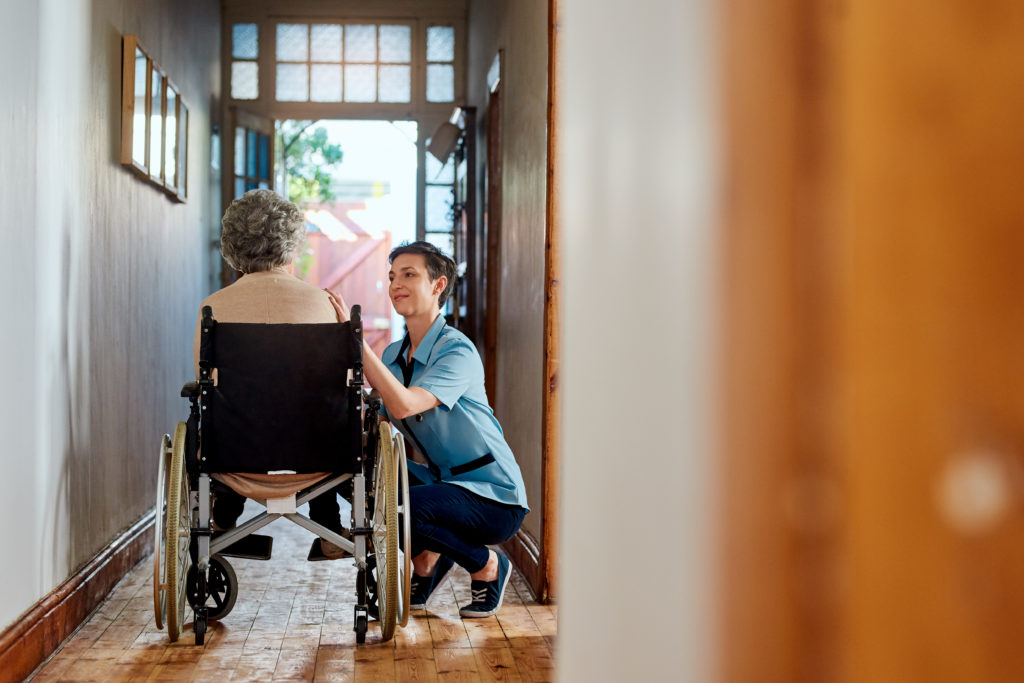
In Hernando and elsewhere in this country, October will be designated as National Depression Awareness and Education Month. Throughout the month, participants will be trying to increase awareness of depression and educate others about the dangers and problems associated with depression. Sometimes the first person to notice some of the strange signs accompanying depression will be the senior’s regular caregiver since senior home care often involves being around a patient for several hours each day. In this article, we’ll discuss some of the most prominent signs that indicate a senior may be suffering from depression.
More intense feelings
Depression often causes people to exhibit strong mood shifts and behaviors that they wouldn’t ordinarily have displayed before the depression. Depression can cause intense feelings of panic, tension, nervousness or anxiety, grief, irritability, or sadness. Typically, depressed women will experience more sadness, while men display intense feelings of anger, irritability, and aggressiveness. When a person is depressed for a while, it can cause their behaviors to change significantly. For instance, someone who is normally an attentive, mild-mannered driver might exhibit signs of road rage and aggression on the road.
Pessimism about life
When an individual becomes chronically depressed, you might observe significant changes in their overall mood, as well as their outlook on life. People who are depressed tend to have a much darker view of the world and their place in it. By contrast, those who are not depressed tend to feel more optimistic about life and what they can achieve. Pessimism about life is a natural consequence of depression, and scientists have found this to be so prevalent that they’ve invented a new term for it – depressed realism. Those who have depressed realism are more likely to be extremely practical about situations they encounter and do not view such events through rose-colored glasses, as more optimistic people might.
Increased alcohol consumption
It happens quite often that depressed individuals will turn to alcohol to forget about their dark view of the world. It is known that consuming alcohol triggers the release of more endorphins (the ‘feel good’ hormone) and that helps depressed individuals cope with the increasingly dark views they have. If you’re a caregiver for a senior loved one, you may notice them increasing their alcohol intake or drinking more often than they used to. These are subtle but very indicative signs of someone struggling with depression. Studies have shown that increased alcohol intake is one of the surest signs of depression – it’s considered to be the number one indicator of depression in an individual.
Changes in eating habits
It’s very common for depressed people to have a sudden change in dietary habits and interests. Many times, increasing depression will cause a release of additional cortisol into the body, and this will deepen the stress felt by the individual. Quite often, depressed people will experience a loss of appetite, because foods no longer taste good to them. In other cases, depressed individuals might crave more food, because they’re unconsciously seeking foods containing more serotonin, sometimes referred to as the happiness hormone. As a caregiver, you should encourage your charge to eat more fruits and vegetables, fish, and whole grains, while avoiding processed foods and those high in sugar content. Consuming high-sugar foods may produce a temporary good feeling, but when that wears off, depression will come roaring back.
Irregular sleeping habits
It’s very common to observe someone who is depressed having sudden changes to their sleeping habits, either sleeping much more or much less than before. Sometimes the depressed person will complain about having no energy or about how tired they are. These are sure signs that they’re not getting the sleep they need and that something is keeping them awake. Extensive research has found a direct correlation between depression and getting inadequate sleep. Depression can cause a person to have difficulty falling asleep, staying asleep, or rising from the bed each morning. When your senior loved one develops bags under their eyes, or exhibits other signs of interrupted sleep, you should investigate the situation to determine whether or not depression may be involved.
Toxic positivity
This phrase was coined when it was found that many depressed people wear a forced smile on their face so as to cover up their ongoing battle with depression. Someone who seems overly cheerful for no apparent reason may be masking their real feelings, and internalizing all the stress and doubt they’re feeling. It’s easy to see why this could deteriorate into a toxic situation that would be extremely harmful to the person. When you see signs of seemingly artificial cheerfulness, it could very well be a sign that the person is covering up their real feelings. However, they won’t be able to maintain that facade forever, so watch closely for peeks at their true feelings. If you suspect depression, you should immediately schedule an appointment with your family doctor so the condition gets treated.
